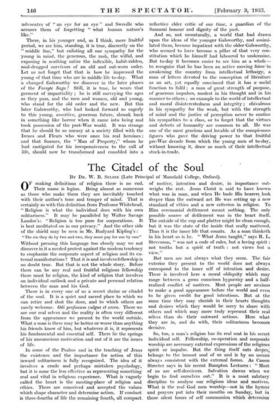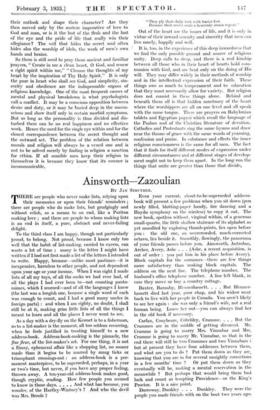The Citadel of the Soul
By DR. W. B. SELBIE (Late Principal of Mansfield College, Oxford).
OF making definitions of religion there is no end. Their name is legion. Being almost as numerous as those who make them they are inevitably touched with their author's tone and temper of mind. That is certainly so with this definition from Professor Whitehead. " Religion is what the individual does with his own solitariness." It may be paralleled by Walter Savage Landor's: "Religion is too pure for corporations. It is best meditated on in our privacy." And the other side of the shield may be seen in Mr. Rudyard Kipling's : "The sin they do by two and two, they must pay for one by one:"
Without pressing this language too closely may we not discover in it a needed protest against the modern tendency to emphasize the corporate aspect of religion and its ex- ternal manifestations ? That it is and involves fellowship is no doubt true. But that is not the whole story. Before there can be any real and fruitful religious fellowship there must be religion, the kind of religion that involves an individual outlook and a private and personal relation between the man and his God.
There is in every one of us a secret shrine or citadel of the soul. It is a quiet and sacred place to which we can retire and shut the door, and to which others are rarely welcome. Odi profanum vulgus et arceo. There we are our real selves and the reality is often very different from the appearance we present to the world outside. What a man is there may be better or worse than anything his friends know of him, but whatever-it is, it represents his fundamental and essential self. There lie the springs of his unconscious motivation and out of it are the issues of life.
In some of the Psalms and in the teaching of Jesus the existence and the importance for action of this inward solitariness is fully recognized. The idea of it involves a crude and perhaps mistaken' psychology, but it is none the less effective as representing something real and vital in religious experience. What is vaguely called the heart is the meeting-place of religion and ethics. There are conceived and accepted the values. which shape character and determine action. If conduct is three-fourths of life the remaining fourth, all compact_
of motive, intention and desire, in importance out- weighs the rest. Jesus Christ is said to have known what was in man, and when He bade His hearers look deeper than the outward act He was setting up a new standard of ethics and a new criterion in religion. To Him ceremonial defileMent meant nothing. The only possible source of defilement was in the heart itself. The outside of the cup and platter might be clean enough, but it was the state of the inside that really mattered. Thus it is the inner life that counts. As a man thinketh in his heart so is he. " What Jesus taught," says R. L. Stevenson, " was not a. code of rules, but a loving spirit : not truths but a spirit of truth : not views but a view."
But men are not always what they seem. The fair exterior they present to the world does not always correspond to the inner self of intention and desire. There is involved here a moral obliquity which may range between a gross conscious hypocrisy and a half- realized conflict of motives. Most people are anxious to make a good appearance before the world and even to be given credit for good intentions. But at the same time they may cherish in their hearts thoughts and desires which they would be sorry to share with others and which may more truly represent their real selves than do their- outward actions. Here what they arc in, and do with, their solitariness becomes decisive.
So, too, a man's religion has its real seat in his secret individual self. Fellowship, co-operation and corporate worship are necessary external expressions of the religious spirit or impulse. But the thing itself cuts deeper,: belongs to the inmost soul of us and is by no means always consistent with the external forms. As Canon Streeter says in his recent Bampton Lectures : " Most of us arc self-deceivers. Salvation dawns when we begin to find ourselves out." It is a mast salutary discipline to analyse our religious ideas and motives: What is the real God men worship—not in the hymns and prayers put into - their mouths on Sunday, but hi those silent hours of self communion which 'determine their outlook and shape their character? Are they then moved only by the austere imperative of love to God and man, or is it the lust of the flesh and the lust of the eye and the pride of life that really win their allegiance ? The veil that hides the secret soul often hides also the worship of idols, the work of men's own hands and brains.
So, there is still need to pray those ancient and familiar prayers, " Create in me a clean heart, 0 God, and renew a right spirit within me," " Cleanse the thoughts of my hegrt..hy the inspiration of Thy Holy Spirit." It is only the pure in heart who shall see God, and simplicity, sin- cerity and obedience are the indispensable organs of religious knowledge. One of the most frequent causes of mental and physical breakdown is what psychologists call a conflict. It may be a conscious opposition between desire and duty, or it may be buried deep in the uncon- scious and show itself only in certain morbid symptoms. But so long as the personality is thus divided and dis- turbed there can be no real happiness and no effective work. Hence the need for the single eye within and for the closest correspondence between the secret thought and the outward act. The problem of the relation between morals and religion will always be a vexed one and is not to be solved merely by finding in religion a sanction for ethics. If all sensible men keep their religion to themselves it is because they know that its essence is incommunicable,
.They.ply their daily task with busier feet Because their secret souls a heavenly strain repeat."
Out of the heart are the issues of life, and it is only in virtue of their inward serenity and sincerity that men can live sanely, happily and well.
It is, too, in the experience of this deep inwardness that we find the only possible ground and source of religious unity. Deep calls to deep, and there is a real kinship between all those who in their heart of hearts hold com- munion with God, and arc bent only on the doing of His will. They may differ widely in their methods of worship and in the intellectual expression of their faith. These things owe so much to temperament and to education that they must necessarily allow for variety. But religion does not consist in these things alone. Behind and beneath them all is that hidden sanctuary of the heart where the worshippers are all on one level and all speak with the same tongue. There are prayers on Babylonian tablets and Egyptian papyri which recall the language of the Psalms and of the Christian literature of devotion. Catholics and Protestants sing the same hymns and draw near the throne of grace with the same words of yearning, confession and praise. In substance and effects the inner religious consciousness is the same for all men. The fact that it finds for itself different modes of expression under different circumstances and at different stages of develop- ment ought not to keep them apart. In the long run the things that unite arc greater than those that divide.





































 Previous page
Previous page